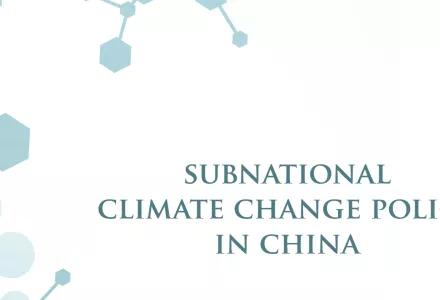
Overview
Climate change is a global commons problem and therefore necessitates cooperation at the highest jurisdictional level — that is, international cooperation among national governments — if it is to be adequately addressed. However, both national and subnational governments can significantly advance efforts to mitigate climate change. Provinces and municipalities around the world have indeed undertaken initiatives — sometimes working together across national boundaries — to reduce greenhouse-gas emissions. This includes jurisdictions in the largest-emitting countries — China, the United States, and India — as well as in the European Union.
This volume examines subnational climate-change policy in China — including how Chinese provinces and municipalities work with the central government to implement policy. The volume focuses to a considerable degree on carbon-pricing policy in China, including how China’s subnational (pilot) emissions-trading systems can inform the emerging national carbon-pricing system.
The briefs in this volume draw on presentations and discussion at a research workshop organized by the Harvard Project on Climate Agreements in Beijing on July 18–19, 2019. The workshop was hosted and co-sponsored by Tsinghua University’s Institute of Energy, Environment, and Economy, directed by Professor Zhang Xiliang. Workshop participants included 24 researchers and practitioners from China, Australia, Canada, India, Norway, the United Kingdom, and the United States. Chinese participants were based in Guangdong Province, Hubei Province, and Shanghai, as well as Beijing. The agenda and participant list for the workshop are included at the end of the volume.
The Harvard Project has also released a discussion paper by Michael Davidson, who participated in the workshop and whose brief is included in the volume, “Creating Subnational Climate Institutions in China.” The paper describes the evolution of decentralization over the reform period that began in China in 1978, different theories of institutional change in China, and how the empirical and theoretical literatures help us understand the development of institutions for addressing climate change.
This volume, the July 2019 workshop, and Professor Davidson’s paper are part of a larger initiative of the Harvard Project on Climate Agreements examining and comparing subnational climate-change policy in China, India, the United States, and Canada. The Harvard Project is conducting a similar workshop in New Delhi in the summer of 2020 and will release a volume of briefs on subnational climate-change policy in India in early 2021.
Each of the seventeen briefs in this volume begins with several key points, and the seventeen sets of key points are compiled immediately following the introduction. We hope that this structure renders the insights, research results, and analysis contained in the briefs more readily accessible.
Chinese versions of the compilation of key points and introduction are included in the volume.
The Harvard Project on Climate Agreements is grateful to the Harvard Global Institute, which provides generous support for the initiative of which this volume and the July 2019 workshop in Beijing are part. We are also grateful for our ongoing collaboration with Professor Zhang Xiliang and his colleagues — a collaboration that has yielded insights that we hope prove useful to researchers and policy makers working to address the problem of climate change.
Stavins, Robert N. and Robert C. Stowe, eds. Subnational Climate Change Policy in China. Cambridge, Massachusetts: Harvard Project on Climate Agreements, February 2020.







